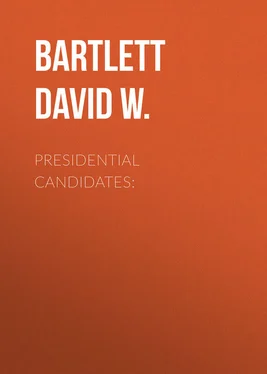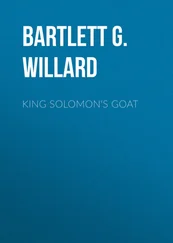David Bartlett - Presidential Candidates:
Здесь есть возможность читать онлайн «David Bartlett - Presidential Candidates:» — ознакомительный отрывок электронной книги совершенно бесплатно, а после прочтения отрывка купить полную версию. В некоторых случаях можно слушать аудио, скачать через торрент в формате fb2 и присутствует краткое содержание. ISBN: , Жанр: foreign_antique, foreign_prose, на английском языке. Описание произведения, (предисловие) а так же отзывы посетителей доступны на портале библиотеки ЛибКат.
- Название:Presidential Candidates:
- Автор:
- Жанр:
- Год:неизвестен
- ISBN:http://www.gutenberg.org/ebooks/35400
- Рейтинг книги:4 / 5. Голосов: 1
-
Избранное:Добавить в избранное
- Отзывы:
-
Ваша оценка:
- 80
- 1
- 2
- 3
- 4
- 5
Presidential Candidates:: краткое содержание, описание и аннотация
Предлагаем к чтению аннотацию, описание, краткое содержание или предисловие (зависит от того, что написал сам автор книги «Presidential Candidates:»). Если вы не нашли необходимую информацию о книге — напишите в комментариях, мы постараемся отыскать её.
Presidential Candidates: — читать онлайн ознакомительный отрывок
Ниже представлен текст книги, разбитый по страницам. Система сохранения места последней прочитанной страницы, позволяет с удобством читать онлайн бесплатно книгу «Presidential Candidates:», без необходимости каждый раз заново искать на чём Вы остановились. Поставьте закладку, и сможете в любой момент перейти на страницу, на которой закончили чтение.
Интервал:
Закладка:
Mr. Douglas voted to bring up the Homestead bill which was before the last Congress and which passed the House, showing that he is in favor of that important measure.
We now come to the history of Mr. Douglas in connection with the Kansas-Nebraska bill.
The battle which he waged with his political opponents and won upon that bill is so fresh in the memory of all our readers that it will not be safe, or necessary, to go into a minute history of the struggle. In the winter of 1852-3, Mr. Douglas reported a Nebraska bill from the Territorial Committee of which he was chairman, which contained no repeal of the Missouri Compromise or enumeration of his peculiar Popular Sovereignty doctrines. In the great debate over the compromise measures in 1850, no one ever called in question the Missouri Compromise. In the winter of 1852-3, Senator Atchison, of Missouri, declared in his seat in the Senate that the Missouri prohibition could never be repealed.
The Kansas-Nebraska bill as reported from the Committee appeared first without any repeal of the Missouri restriction – on the 7th day of January it was first presented. On the 16th, Mr. Dixon, a Whig senator from Kentucky, proposed an amendment to the bill reported from the committee which repealed the aforesaid compromise. This movement was at first opposed by leading Democrats and their organ the Union , but in a very few days Mr. Douglas, either because he saw the justice of the repeal of the restriction or thought it would advance his political interests, acquiesced in the amendment and made it a part of his bill. We make a few brief extracts from Mr. Douglas's argument in the Senate, Jan. 30, 1854, in support of his bill:
"Sir, I wish you to bear in mind, too, that this geographical line, established by the founders of the Republic between free territories and slave territories, extended as far westward as our territory then reached; the object being to avoid all agitation upon the slavery question by settling that question forever, as far as our territory extended, which was then to the Mississippi River.
"When, in 1803, we acquired from France the territory known as Louisiana, it became necessary to legislate for the protection of the inhabitants residing therein. It will be seen by looking into the bill establishing the territorial government in 1805 for the territory of New Orleans, embracing the same country now known as the State of Louisiana, that the ordinance of 1787 was expressly extended to that territory, excepting the sixth section, which prohibited slavery. Then that act implied that the Territory of New Orleans was to be a slaveholding territory, by making that exception in the law. But, sir, when they came to form what was then called the Territory of Louisiana, subsequently known as the Territory of Missouri, north of the thirty-third parallel, they used different language. They did not extend the ordinance of 1787 to it at all. They first provided that it should be governed by laws made by the governor and the judges, and when, in 1812, Congress gave to that territory, under the name of the Territory of Missouri, a territorial government, the people were allowed to do as they pleased upon the subject of slavery, subject only to the limitations of the Constitution of the United States. Now, what is the inference from that legislation? That slavery was, by implication, recognized south of the thirty-third parallel; and north of that, the people were left to exercise their own judgment and do as they pleased upon the subject, without any implication for or against the existence of the institution.
"This continued to be the condition of the country in the Missouri territory up to 1820, when the celebrated act which is now called the Missouri Compromise act was passed. Slavery did not exist in, nor was it excluded from the country now known as Nebraska. There was no code of laws upon the subject of slavery either way: First, for the reason that slavery had never been introduced into Louisiana and established by positive enactment. It had grown up there by a sort of common law, and been supported and protected. When a common law grows up, when an institution becomes established under a usage, it carries it so far as that usage actually goes, and no further. If it had been established by direct enactment, it might have carried it so far as the political jurisdiction extended; but, be that as it may, by the act of 1812, creating the territory of Missouri, that territory was allowed to legislate upon the subject of slavery as it saw proper, subject only to the limitations which I have stated; and the country not inhabited or thrown open to settlement was set apart as Indian country and rendered subject to Indian laws. Hence, the local legislation of the State of Missouri did not reach into that Indian country, but was excluded from it by the Indian code and Indian laws. The municipal regulations of Missouri could not go there until the Indian title had been extinguished and the country thrown open to settlement. Such being the case, the only legislation in existence in Nebraska territory at the time that the Missouri act passed, namely, the 6th of March, 1820, was a provision, in effect, that the people should be allowed to do as they pleased upon the subject of slavery.
"The territory of Missouri having been left in that legal condition, positive opposition was made to the bill to organize a state government, with a view to its admission into the Union; and a senator from my State, Mr. Jesse B. Thomas, introduced an amendment, known as the eighth section of the bill, in which it was provided that slavery should be prohibited north of 36° 30' north latitude, in all that country which we had acquired from France. What was the object of the enactment of that eighth section? Was it not to go back to the original policy of prescribing boundaries to the limitation of free institutions, and of slave institutions, by a geographical line, in order to avoid all controversy in Congress upon the subject? Hence, they extended that geographical line through all the territory purchased from France, which was as far as our possessions then reached. It was not simply to settle the question on that piece of country, but it was to carry out a great principle, by extending that dividing line as far west as our territory went, and running it onward on each new acquisition of territory. True, the express enactment of the eighth section of the Missouri act, now called the Missouri Compromise act, only covered the territory acquired from France; but the principles of the act, the objects of its adoption, the reasons in its support, required that it should be extended indefinitely westward, so far as our territory might go, whenever new purchases should be made.
"Thus stood the question up to 1845, when the joint resolution for the annexation of Texas passed. There was inserted in that a provision, suggested in the first instance and brought before the House of Representatives by myself, extending the Missouri Compromise line indefinitely westward through the territory of Texas. Why did I bring forward that proposition? Why did the Congress of the United States adopt it? Not because it was of the least practical importance, so far as the question of slavery within the limits of Texas was concerned; for no man ever dreamed that it had any practical effect there. Then, why was it brought forward? It was for the purpose of preserving the principle, in order that it might be extended still further westward, even to the Pacific Ocean, whenever we should then acquire country that far. I will here read that clause in the joint resolution for the annexation of Texas. It is the third article, second section, and is in these words:
"'New States, of convenient size, not exceeding four in number, in addition to said State of Texas, having sufficient population, may hereafter, by the consent of said State, be formed out of the territory thereof which shall be entitled to admission under the provisions of the Federal Constitution. And such States as may be formed out of that portion of said territory, lying south of 36° 30' north latitude, commonly known as the Missouri Compromise line, shall be admitted into the Union with or without slavery, as the people of each State asking admission may desire. And in such State or States as shall be formed out of said territory north of said Missouri Compromise line, slavery or involuntary servitude (except for crime) shall be prohibited.'
Читать дальшеИнтервал:
Закладка:
Похожие книги на «Presidential Candidates:»
Представляем Вашему вниманию похожие книги на «Presidential Candidates:» списком для выбора. Мы отобрали схожую по названию и смыслу литературу в надежде предоставить читателям больше вариантов отыскать новые, интересные, ещё непрочитанные произведения.
Обсуждение, отзывы о книге «Presidential Candidates:» и просто собственные мнения читателей. Оставьте ваши комментарии, напишите, что Вы думаете о произведении, его смысле или главных героях. Укажите что конкретно понравилось, а что нет, и почему Вы так считаете.










